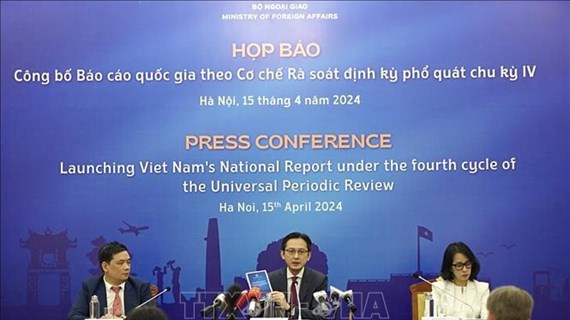Q1 budget revenue: positive signs for rest of year
State budget collection in the first quarter of 2014 recorded a
significant increase of nearly 16 percent over the same period last
year, creating favourable conditions to implement budget spending,
ensure a balanced budget and maintain macroeconomic stability.
State budget collection in the first quarter of 2014 recorded a
significant increase of nearly 16 percent over the same period last
year, creating favourable conditions to implement budget spending,
ensure a balanced budget and maintain macroeconomic stability.
General Director of the General Department of Taxation Bui Van Nam told Nhan Dan (People) newspaper that frst-quarter budget collection in 2014 saw a substantial increase compared to the same period in recent years which were affected by economic difficulties and sluggish growth.
The domestic collection in the first quarter of this year was recorded at nearly 134 trillion VND (6.2 billion USD), equivalent to 24.8 percent of the annual estimate and 16.5 percent higher than the same period last year. It was also the highest first-quarter revenue in the past three years.
Nam attributed the robust results of Q1’s domestic revenue to the close and effective coordination between central and local authorities. The results represent the sound leadership of the Government, the directions of the Finance Ministry and the efforts of tax authorities who strengthened budget collection measures early this year to prevent tax pileup in the middle and end of the year.
The finance sector has also implemented several new policies that have helped increase budget revenue - for instance, the fines collected from traffic safety violations, collection from accrued corporate income and others.
The increase in revenue may also be attributed to tightened inspection and supervision of budget collection, VAT refunds, transfer pricing, e-commerce business, online business and so on. In the first two months of this year, nearly 5,500 enterprises were inspected, resulting in an additional 1 trillion VND (47 million USD) paid to the state budget. The implementation of such comprehensive measures has brought about positive budget revenue results in the first quarter.
The tax official said in the remaining quarters of 2014, tax authorities at all levels will continue undertaking measures that have proven effective and that are aligned with the guidance of the Government, Finance Ministry and local authorities.
General Director of the General Department of Taxation Bui Van Nam told Nhan Dan (People) newspaper that frst-quarter budget collection in 2014 saw a substantial increase compared to the same period in recent years which were affected by economic difficulties and sluggish growth.
The domestic collection in the first quarter of this year was recorded at nearly 134 trillion VND (6.2 billion USD), equivalent to 24.8 percent of the annual estimate and 16.5 percent higher than the same period last year. It was also the highest first-quarter revenue in the past three years.
Nam attributed the robust results of Q1’s domestic revenue to the close and effective coordination between central and local authorities. The results represent the sound leadership of the Government, the directions of the Finance Ministry and the efforts of tax authorities who strengthened budget collection measures early this year to prevent tax pileup in the middle and end of the year.
The finance sector has also implemented several new policies that have helped increase budget revenue - for instance, the fines collected from traffic safety violations, collection from accrued corporate income and others.
The increase in revenue may also be attributed to tightened inspection and supervision of budget collection, VAT refunds, transfer pricing, e-commerce business, online business and so on. In the first two months of this year, nearly 5,500 enterprises were inspected, resulting in an additional 1 trillion VND (47 million USD) paid to the state budget. The implementation of such comprehensive measures has brought about positive budget revenue results in the first quarter.
The tax official said in the remaining quarters of 2014, tax authorities at all levels will continue undertaking measures that have proven effective and that are aligned with the guidance of the Government, Finance Ministry and local authorities.
Debt management and tax
debt enforcement will be tightened to prevent the arising of new tax
debts. Taxation agencies will carry out new policies to facilitate
enterprises in accumulating capital for production and business
activities in order to nurture these sources of revenue. At the same
time, tax violations will be handled strictly to prevent losses to the
state budget, contributing to increasing revenue in a sustainable way.-VNA













